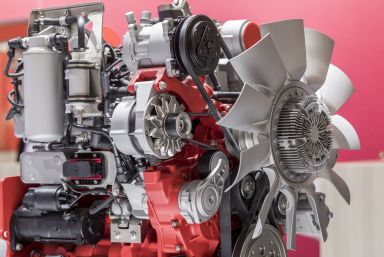
A diesel power plant is the most economical way of providing electricity on a small scale in areas that are rural or remote and where cheap fuels are not available and large loads are required. There are many different types of diesel engines that are available to provide power according to the situation.
Here are some of the different types of diesel engines used for diesel power plants:
Medium-speed four-stroke engines — these diesel engines are capable of generating large amounts of power, making them particularly suited to power plants. They can cope with both baseload requirements while also being capable of meeting peak demands. Hence their flexibility means they operate efficiently.
Four-strokes optimise combustion and energy conversion, thus increasing efficiency in fuel consumption, leading to lower costs. Overall, these advantages, along with their robust construction, make medium-speed four-stroke engines reliable and efficient in medium to large-scale power plants.
High-speed four-stroke engines — as their name implies, operate at higher speeds to the medium-speed engines, working at 1,000 to 3,000 revolutions per minute. Their combustion process is intake, compression, power and exhaust strokes.
With quick start-up capabilities, high-speed engines are suitable for applications where quick start ups are required and demands for power vary. Their compact size makes them most suited to mobile applications or to small diesel power plants. They can also be used for emergency backup power, standby power or industrial machinery.
Low-speed two-stroke engines — also known as slow-speed, operate below 300 revolutions per minute. Whilst a four-stroke engine has a combustion process of intake, compression, power and exhaust strokes, the two-stroke cycle is compression and power. Because the diesel engine works at low speed and with high combustion pressures, two-stroke engines are constructed with more powerful engine components.
This robust construction leads to a longer operational life and reliability, making them ideal for continuous power generation. As the two-stroke diesel engine delivers high power and fuel efficiency, along with reliability, they are suited to large-scale power plants
Dual-fuel engines — utilise a combination of diesel and natural gas or biogas. The primary fuel is diesel, which is injected into the cylinder where it combusts. It then acts as a pilot for igniting the gaseous fuel, which is injected with the intake air.
The two combined thus contribute to the energy output and power generation. Timing and control of ignition is important and depends on various factors such as engine load, speed and fuel composition, which an engine control unit monitors closely.
A dual-fuel engine offers flexibility in fuel choice, with the potential for operational cost savings due to the lower price of gaseous fuels. These engines are suitable for stationary power plants with access to both fuel sources.
Choosing the correct diesel engine for the application will depend upon factors such as load requirements, fuel availability, location and financial considerations.
DEUTZ diesel engines are renowned for their robustness, reliability, efficiency, and versatility, perfect for a wide range of applications, including power plants. Reach out to the DEUTZ New Zealand Sales Team today to explore the best options for your diesel power plant needs.

